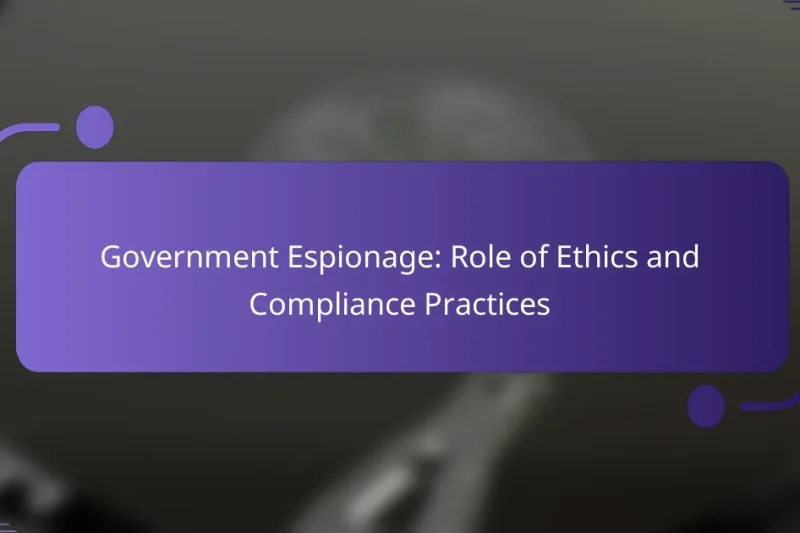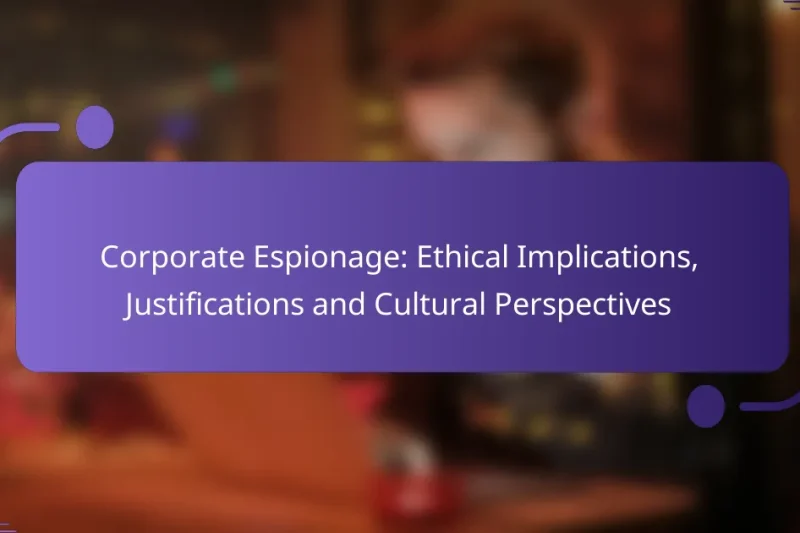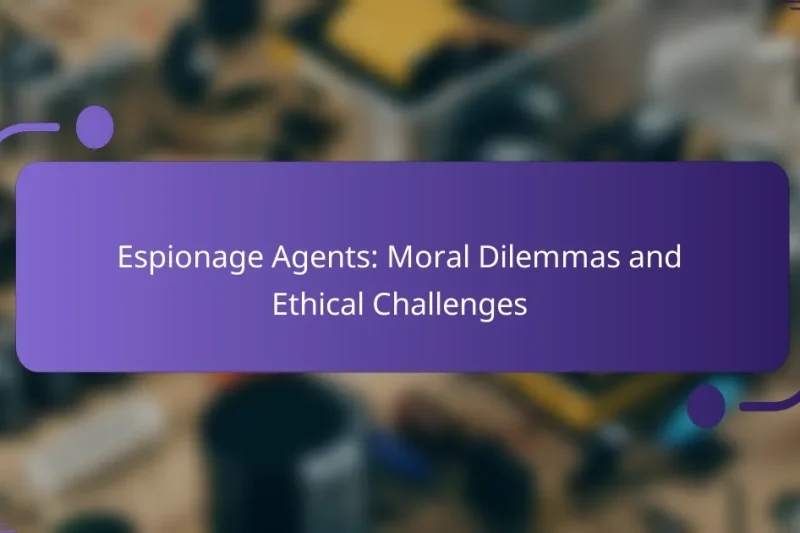Fostering an ethical culture within organizations is essential for preventing espionage and ensuring compliance with legal … Ethical Culture: Fostering Prevention of Espionage and ComplianceRead more
Ethics of Espionage: Navigating Moral Dilemmas
The ethics of espionage presents a complex landscape where national security interests often clash with individual rights and privacy concerns. As intelligence officers navigate these moral dilemmas, they must weigh the necessity of their actions against the potential for abuse of power. Different countries approach these ethical challenges in varied ways, influenced by their legal systems and cultural perspectives on transparency and accountability.
Cultural Differences: Perspectives on Espionage Ethics and Morality
Cultural differences play a crucial role in shaping perspectives on the ethics and morality of espionage. … Cultural Differences: Perspectives on Espionage Ethics and MoralityRead more
Government Espionage: Role of Ethics and Compliance Practices
The intersection of ethics and compliance in government espionage is critical for maintaining a balance between … Government Espionage: Role of Ethics and Compliance PracticesRead more
National Security: Justifications for Espionage and Ethical Considerations
Espionage plays a crucial role in national security by enabling nations to gather intelligence that protects … National Security: Justifications for Espionage and Ethical ConsiderationsRead more
Espionage Legislation: Impact of Ethical Considerations and Compliance
Espionage legislation in the United States establishes stringent requirements for organizations in managing sensitive information, making … Espionage Legislation: Impact of Ethical Considerations and ComplianceRead more
Corporate Espionage: Ethical Implications, Justifications and Cultural Perspectives
Corporate espionage raises complex ethical questions regarding trust, integrity, and fairness within the business landscape. While … Corporate Espionage: Ethical Implications, Justifications and Cultural PerspectivesRead more
Espionage Agents: Moral Dilemmas and Ethical Challenges
Espionage agents face profound moral dilemmas that test their ethical beliefs and personal values, often involving … Espionage Agents: Moral Dilemmas and Ethical ChallengesRead more
What are the ethical implications of espionage in the United States?
The ethical implications of espionage in the United States revolve around the balance between national security and individual rights. While espionage can protect citizens and state interests, it raises significant moral questions about privacy, legality, and the potential for abuse of power.
Impact on national security
Espionage plays a crucial role in enhancing national security by providing vital intelligence that can prevent threats. For example, gathering information on potential terrorist activities can lead to preemptive actions that save lives. However, reliance on espionage can create a culture of secrecy that may hinder transparency and accountability.
Moreover, the effectiveness of espionage is often contingent on the ethical standards upheld by intelligence agencies. When ethical boundaries are blurred, the risk of false intelligence and misjudgments increases, potentially leading to misguided policies or military actions.
Consequences for international relations
Espionage can significantly impact international relations, often straining diplomatic ties between countries. When espionage activities are exposed, they can lead to public outrage and retaliatory measures, as seen in various high-profile cases involving U.S. intelligence operations abroad. Such incidents can foster distrust and animosity among nations.
On the other hand, effective espionage can also facilitate negotiations by providing insights into the intentions of other states. Understanding a rival’s capabilities and strategies can help in crafting more informed and strategic diplomatic approaches.
Public perception and trust
The public’s perception of espionage is complex and often polarized. While many citizens recognize the necessity of intelligence gathering for national safety, there is a growing concern about privacy violations and government overreach. High-profile leaks and scandals can erode public trust in government institutions.
To maintain public confidence, transparency and accountability in espionage practices are essential. Engaging in open dialogues about the ethical boundaries of intelligence operations can help bridge the gap between security needs and civil liberties, fostering a more informed citizenry.
How do different countries approach espionage ethics?
Countries vary significantly in their approaches to espionage ethics, influenced by legal frameworks, cultural attitudes, and national security needs. While some nations prioritize transparency and accountability, others adopt a more pragmatic stance, viewing espionage as a necessary tool for statecraft.
United Kingdom’s legal framework
The United Kingdom operates under a complex legal framework regarding espionage, primarily governed by the Official Secrets Act. This legislation outlines the obligations of government employees to protect sensitive information and penalizes unauthorized disclosures.
In practice, the UK balances national security interests with civil liberties, often scrutinizing intelligence activities through oversight bodies. The Investigatory Powers Act also regulates surveillance, ensuring that espionage activities are conducted within legal boundaries.
China’s state-driven espionage policies
China’s approach to espionage is heavily state-driven, with the government actively encouraging intelligence gathering to bolster national security and economic interests. The National Intelligence Law mandates that organizations and citizens assist in state intelligence work, blurring the lines between private and state activities.
Espionage in China often focuses on technology and economic information, with significant resources allocated to cyber-espionage. This state-centric model raises ethical concerns, particularly regarding privacy and the rights of individuals and businesses.
Russia’s historical context
Russia’s espionage practices are deeply rooted in its historical context, particularly the legacy of the Soviet Union’s intelligence operations. The KGB’s methods have influenced contemporary Russian espionage, which often emphasizes state security over individual rights.
Today, Russia employs a mix of traditional and cyber-espionage techniques, often justified by national security narratives. This historical backdrop complicates the ethical landscape, as actions taken in the name of state security can lead to significant moral dilemmas.
What are the moral dilemmas faced by intelligence officers?
Intelligence officers encounter numerous moral dilemmas that challenge their ethical frameworks. These dilemmas often revolve around the conflict between national security interests and the protection of individual rights.
Balancing national interest and human rights
Intelligence work often requires officers to prioritize national security over individual freedoms, leading to ethical conflicts. For instance, surveillance programs may enhance security but infringe on privacy rights, raising questions about the legitimacy of such actions.
Officers must consider the implications of their actions on civil liberties and strive to find a balance that protects both national interests and human rights. Engaging in transparent discussions with policymakers can help navigate these complex issues.
Justification of means versus ends
The debate over whether the ends justify the means is central to the ethics of espionage. Intelligence officers may resort to questionable tactics, such as deception or coercion, to achieve objectives deemed necessary for national security.
It is crucial for officers to critically assess the moral implications of their methods and the potential consequences of their actions. Establishing clear ethical guidelines can aid in making decisions that align with both legal standards and moral principles.
Personal versus professional ethics
Intelligence officers often face a conflict between their personal moral beliefs and the ethical standards of their profession. This tension can lead to difficult choices, especially when personal values clash with directives from superiors or government policies.
To navigate this dilemma, officers should engage in ongoing ethical training and reflection, ensuring they remain aware of their values while fulfilling their professional duties. Creating a supportive environment for discussing ethical concerns can also help mitigate these conflicts.
How can organizations implement ethical guidelines for espionage?
Organizations can implement ethical guidelines for espionage by establishing clear codes of conduct, providing training programs for ethical decision-making, and enforcing accountability measures for breaches. These steps help ensure that espionage activities align with moral standards and legal requirements.
Establishing a code of conduct
A code of conduct serves as a foundational document that outlines acceptable behaviors and practices related to espionage. It should clearly define the ethical boundaries within which employees must operate, including respect for privacy and adherence to local laws.
Organizations can include specific scenarios and examples in the code to illustrate ethical dilemmas and appropriate responses. Regular reviews and updates to the code are essential to adapt to changing legal landscapes and ethical norms.
Training programs for ethical decision-making
Training programs focused on ethical decision-making equip employees with the skills to navigate complex moral dilemmas in espionage. These programs should include case studies, role-playing exercises, and discussions on real-world implications of unethical behavior.
Organizations can implement workshops or online courses that emphasize critical thinking and ethical reasoning. Regular training refreshers help reinforce the importance of ethical considerations in espionage activities.
Accountability measures for breaches
Accountability measures are crucial for maintaining ethical standards in espionage. Organizations should establish clear consequences for breaches of the code of conduct, which may include disciplinary actions or termination of employment.
Regular audits and assessments can help identify potential ethical violations and ensure compliance with established guidelines. Creating a transparent reporting system encourages employees to voice concerns without fear of retaliation, fostering a culture of accountability.
What role does technology play in espionage ethics?
Technology significantly influences the ethics of espionage by enhancing capabilities while raising moral questions. The use of advanced tools can blur the lines between legitimate intelligence gathering and invasive surveillance, prompting ongoing debates about privacy and security.
Use of AI in surveillance
Artificial Intelligence (AI) plays a crucial role in modern surveillance by automating data analysis and pattern recognition. This technology can process vast amounts of information quickly, allowing agencies to identify potential threats more efficiently. However, the reliance on AI raises ethical concerns about bias in algorithms and the potential for misuse.
For instance, AI-driven facial recognition systems can enhance security but may lead to wrongful identification and discrimination against certain groups. Agencies must implement strict guidelines to ensure AI is used responsibly and ethically in surveillance operations.
Data privacy concerns
Data privacy is a significant ethical issue in espionage, especially with the increasing amount of personal information available online. Governments and organizations often collect data without explicit consent, raising questions about individual rights and the limits of state power. Balancing national security interests with citizens’ privacy rights is a complex challenge.
Regulations like the General Data Protection Regulation (GDPR) in Europe impose strict rules on data collection and usage. Agencies must navigate these legal frameworks carefully to avoid infringing on privacy rights while conducting necessary intelligence operations.
Cybersecurity implications
The intersection of espionage and cybersecurity presents unique ethical dilemmas. As technology evolves, so do the methods used by both state and non-state actors to conduct cyber espionage. This raises concerns about the potential for significant data breaches and the impact on national security.
Organizations must prioritize robust cybersecurity measures to protect sensitive information from espionage activities. This includes regular security audits, employee training, and adopting best practices for data protection to mitigate risks associated with cyber threats.
How do cultural perspectives influence espionage ethics?
Cultural perspectives significantly shape the ethics of espionage, as different societies prioritize values like loyalty, honor, and national security in varying degrees. These cultural norms dictate what is considered acceptable behavior in intelligence gathering and can lead to contrasting ethical frameworks.
Western versus Eastern philosophies
Western philosophies often emphasize individual rights and the moral implications of actions, leading to a more critical view of espionage as a potential violation of personal freedoms. In contrast, Eastern philosophies may prioritize collective well-being and national interests, viewing espionage as a necessary tool for safeguarding the state.
For example, in many Western countries, transparency and accountability are valued, which can lead to public scrutiny of espionage activities. Conversely, in some Eastern cultures, the emphasis on harmony and stability might justify espionage as a means to maintain social order and protect the community.
Historical influences on ethical views
Historical events have profoundly impacted how different cultures perceive espionage ethics. For instance, the Cold War era fostered a climate of distrust and justification for espionage in many Western nations, leading to a more pragmatic acceptance of intelligence operations. In contrast, historical conflicts in Eastern societies may have reinforced the belief that espionage is a legitimate strategy for survival.
Additionally, colonial histories have shaped attitudes towards espionage, with some nations viewing it as a tool of oppression while others see it as a means of resistance. Understanding these historical contexts is crucial for grasping the current ethical debates surrounding espionage in various cultures.






